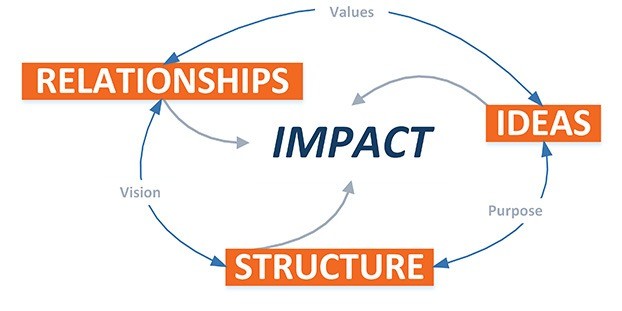In 2006, a television show debuted called Heroes. Unlike almost all superhero movies and television series, this was a show about average people who happened to discover that they had superpowers. The cool thing about this premise is that these people didn’t know that they had superpowers until some situation occurred that required them to use them.
I loved the show because I saw in it something that I had seen constantly over the course of my life. I saw people like you and me, not superstars, but average people, who did things that were amazing in their impact. It wasn’t that they had superpowers. It was that they did things that made a difference. These average people who make a difference in their local communities have been one of the motivating forces behind my creation of the Circle of Impact model of leadership.
The core idea of the Circle of Impact is that all leadership begins with personal initiative to create impact.
The primary implication is that anyone can practice leadership initiative. A second implication is that as long as a person is taking initiative to make a difference that there is no limit to the impact that they can have. All that is required from a practical perspective is to start small and learn as you go. The third implication is that you and I have an unlimited amount of potential to be Persons of Impact.
Let me present this idea in a different way.
The Myth of Limited Potential
The concept of potential that I have heard throughout my life is that there is some arbitrary limit to what we can achieve. This limit is based on the idea that we are not as smart, not as talented, not as rich, not as well connected, as some other person. Therefore, we have limited potential because those other people have more of whatever is required to be a success.
This is obviously a game for playground egotists,“I’m better than you because that’s my ball.”
I don’t find this a valid perspective on potential at all. The primary reason is that it is an attempt to prove something without actually proving it. No one knows the potential of any living person until at some advanced point in their life, we can look back and say, “They made a difference far beyond anyone’s expectations.”
I’ve thought for a long time about the issue of human potential. I have wondered where this idea that our potential is limited comes from. The conclusion that I’ve reached is that, on a personal level, it is a reflection of a range of emotions like fear of failure and self-doubt. On a social level, it is the desire of people, who care about us, to not build up our egos or place us in a situation where we will be disappointed in our failures.
There is a direct connection between this fear of failure and the desire to fulfill our potential. For many people, failing feels like a statement of their worthiness, that they are not good enough to be considered worthy of respect and for the celebration of their accomplishments.
Carrying this burden into every decision and every action means that we are never able to discover our true worth. This belief that our identity or self-respect is dependent upon not failing is an insidious idea that is far too prevalent in our world. Without failure, there can be no success.
Shifting Self-Perception
Potential, therefore, is an open field of opportunity. It is open in the sense that it has not been determined. There are obstacles and challenges along the way. Our potential, though, begins with a belief that we can make a difference on an increasing scale of impact. This perspective requires a shift in our self-perception. It means that we don’t just go through our days doing stuff, trying to avoid making mistakes or embarrassing ourselves.
Sports teams that play not to lose, tend to lose. We aren’t measuring life by our activity schedule or how we aren’t meeting some standard of perfection. Instead, we measure our lives by how we are growing in our capacity to make a difference. Here’s an example.
My fourth-grade teacher was Millie Brown. She could have treated me like just another student.
Check … he is present. Check … he finished that assignment. Check … he finished the requirements for the fourth grade.
She didn’t treat me this way.
Because I was a bit rambunctious, I stayed after school a lot. Two or three times a week for several months. She didn’t punish me. She disciplined me by requiring me to copy pages out of the dictionary for my 45 minutes of detention. From that experience, a love of words grew. Her impact resonates me with me fifty-five years later. She changed my life by being a teacher who cared for this wild, unruly student.
Millie Brown’s potential was released through her students. She could have just done what her contract required and retired with a nice pension and the appreciation of her students and school system. She didn’t approach teaching that way. She saw that her impact was in developing her students. Two decades later, I was able to tell her how much I gained from her discipline. I am grateful today for her impact.
Your Potential Is Not Defined
The first thing to understand about our potential is that it is not a defined amount. It is open to growing as long as we choose to develop it. This idea came to me in talking with people who had early success in their lives. And, then not much after.
Listening to their stories, some had a nostalgic appreciation for their success. They looked back on their golden years, living off the emotional reservoir of those memories. They thought that they had fulfilled their potential by becoming successful.
Our potential is not a defined amount like the money in a bank account. We don’t expend our potential, we invest to grow it. The more we invest by taking initiative to create impact, the greater our potential grows. The measure of our potential is our impact, not the effort we spend to create it.
How to Reach Your Potential
If you have never thought about your potential for making a difference with your life, here are four steps where you can start.
1. Believe in yourself.
Believe that you can make a difference that matters. Look at your situation and decide what one thing you can do right now that will have an impact. Then do it. Then do it again, and again, and again. Over time, you’ll see yourself growing in confidence and perspective about where to put your efforts. It begins with believing that you can.
2. Dream about the farthest reaches of your potential.
Once you have begun to see some results from your efforts to make a difference, then take some time to consider, “What if I spent more of my time on this, what difference can I make in three years?”
From three years, it is not hard to look out to the full extent of your life. Dream about what is possible if you believe and work hard to fulfill the opportunity that exists in your dream.
3. Focus on impact.
The key metric for potential is change.
What do you want to change? And if you focus on this change over the course of the rest of your life, what difference will that make? The focus is not on your potential, but on the impact that fulfills that potential. What is the impact that you want to have with your life?
4. Start small.
It is easy to jump ahead and imagine big successes before you take the first step. It is better to start small and then grow big.
My heroes have been average people who have made a difference wherever they lived and worked. They never thought about their potential. It just wasn’t what their family and community did. Nevertheless, their impact lives on in people like me whose lives were changed because they took the initiative to make a difference.
Your potential is yours. No one can tell you have much or how little you have. It is totally up to you. Think about what is possible if you focused on doing the things that made a difference. Then, you just might begin to see that your life has much more to offer than you ever thought.
Photo by Riccardo Annandale on Unsplash



